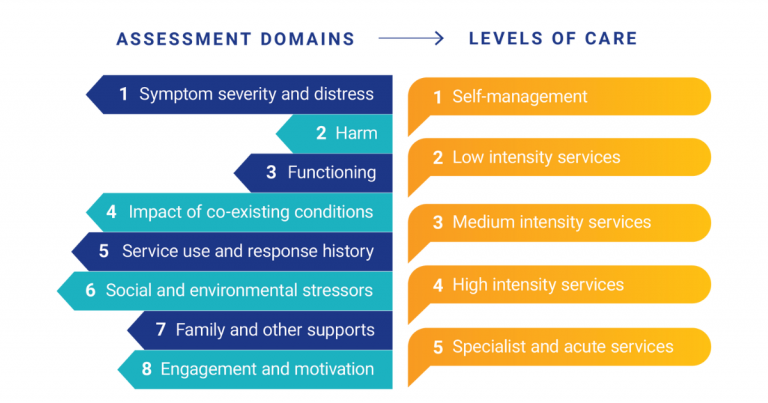People often look to their GP as the first point of contact when seeking mental health support and present with a range of interrelated factors that can make it challenging to determine the most appropriate level of care.
What is IAR?
The Initial Assessment and Referral (IAR) is a holistic decision-making tool that is designed to support clinicians in the initial assessment of a person’s mental health treatment need, using a stepped care approach.
The IAR guidance and Decision Support Tool (IAR-DST) guides clinicians to consider the key information referrers need when conducting a mental health assessment and consider the most appropriate referral pathways. By using clinical judgement combined with using the IAR-DST, will ensure the person seeking support is directed to the right care when they first seek mental health support.
Levels of Care
The IAR tool evaluates patients against eight assessment domains and matches them to a corresponding level of care.

Supporting Access to Mental Health Services
We are developing mental health service directory tools to enable GPs and other clinicians to navigate the local services. On our Mental Health webpage for health professionals, each mental health service is aligned with the five IAR levels of care to support easy referral pathways.
Updates to HealthPathways will be gradually released in 2023 to integrate IAR throughout the referral sections of various pathways. A service directory is also being built to link local commissioned services.
Why Use the Tool?
The IAR-DST:
- Provides a nationally consistent and standardised stepped care approach.
- Will be used by all Commonwealth-funded mental health services and promotes a shared language surrounding treatment needs, and supports clinicians’ choice of referral for mental health consumers.
- Helps identify and summarise the essential information from your mental health assessment that is critical for referral and decision-making.
- Redefines the stepped-care approach to mental health care by recommending a level of care based on the least intensive intervention that will likely lead to the most possible gain for mental health consumers.
- Delivers a shared language to support health professionals in communicating treatment need.
- Categorises mental health treatment needs within five defined levels of care and provides a framework for mental health services to be assigned to these levels, while encouraging consumer-supported choice and decision-making.
- Improves awareness and transparency about how decisions relating to referral appropriateness are made.
Register for Training
Health Professionals can attend a 2 hours workshop (RACGP EA 1.5 hrs & RP 0.5 hrs) that will cover use of the tool, its relevance to general practice and mental health service navigation.
For the latest training information, including dates and times, please contact iar.dst@cesphn.com.au
FAQs
The IAR-DST is currently available on the Australian Government website: iar-dst.online
As of July 2024, adaptations of the IAR-DST have been released for children (5-11 years), adolescents (12-17 years), adults (18-65 years), and older adults (65+ years). The Department of Health and Aged Care continue to explore the development of adaptations for Aboriginal and Torres Strait Islander peoples and people from culturally and linguistically diverse backgrounds.
IAR-DST training is available to GPs, general practice staff, clinicians, and other mental health service providers in Western Sydney.
For the latest training information, including dates and times, please contact iar.dst@cesphn.com.au
The training consists of a two-hour workshop delivered either face-to-face or online.
For the latest training information, including dates and times, please contact iar.dst@cesphn.com.au
In 2023 GPs will be able to claim a minimum of 2 hours of CPD from the RACGP. This may be extended based on additional post-workshop practical activities you choose to complete. A certificate of completion will be provided to all participants who complete the two-hour training. Attendance will be recorded when you join the online or face-to-face sessions and actively participate in the entire session.
The Department of Health and Aged Care (DoHAC) has advised that the integration of IAR-DST into GP clinical software is planned for June 2023.
There are no immediate plans to introduce new MBS items for the IAR-DST. However, nothing prevents GPs administering the IAR-DST using existing MBS items provided they meet the MBS item descriptor and all other legislative requirements.
The priority is making the IAR-DST accessible and available to GPs in a way that enables them to use it easily as part of their workflows. Future enhancement to IAR-DST, including potential integration into mental health treatment plans, will be considered as more GPs utilise the tool.
- Using the IAR – A Quick Reference Guide
- Primary Health Networks (PHN) mental health care guidance: initial assessment and referral for mental health care
For additional questions and support, contact our IAR Training and Support team via email at iar@wentwest.com.au or call 8811 7117.